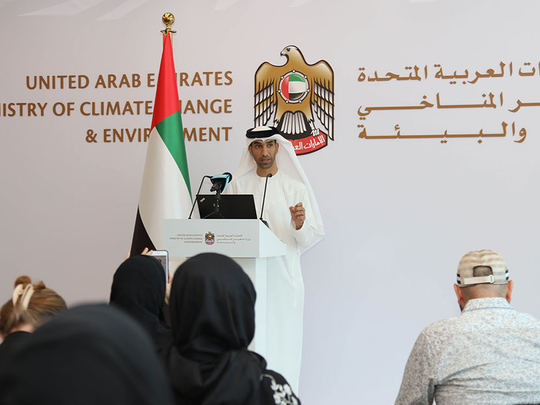
Dubai: The UAE aspires to be among the most liveable countries in the world as the Ministry of Climate Change and Environment (MOCCAE) announced this as the key focus of its new five-year plan.
Unveiling the highlights of the ministry’s fourth strategic plan, Dr Thani Ahmad Al Zeyoudi, Minister of Climate Change and Environment, said the UAE seeks to achieve the target of becoming one of the most liveable countries worldwide by 2021.
“The ministry’s fourth strategic plan revolves around seven key objectives and the primary focus of these objectives is to create a healthy and sustainable society that is among the most liveable in the world, which is also part of the UAE Vision 2021 and the MOCCAE aims to help achieve this national goal in the run-up to the UAE’s golden jubilee celebrations,” said Al Zeyoudi, speaking at a press conference to announce the new strategy on Tuesday.
Al Zeyoudi was speaking to the media at the ministry’s newly opened office building in Al Ruwaiyah on the Dubai-Al Ain road.
He added that the new strategic plan will focus on promoting environmental health and transition to a green economy, achieving sustainability of natural resources, enhancing diversity, safety and security of food supplies, mitigating the impacts of climate change as well as developing legislations that help foster sustainable growth.
“In the last two years, we have been working on formulating the new strategic plan which aims to implement the Vision 2021; we are now beginning to realise this vision by creating the right atmosphere and taking steps that will help UAE’s transition into a green economy,” said Al Zeyoudi.
One of the main steps in achieving the goal of a green economy, according to Al Zeyoudi, is to improve the carbon footprint by reduce dependence on depleting natural resources.
“Sustainable growth can be achieved by optimally leveraging innovative technology, which will automatically lead to a reduction in irrational exploitation of natural resources,” he added.
Al Zeyoudi said the strategic plan is based on a comprehensive study of the UAE’s environment.
“It factors in current environmental challenges and trends, results of earlier efforts and relevant international developments, as well as the targets outlined in the UAE Vision 2021 and various national strategies, and those reflected in our international commitments related to the environment and sustainable development.”
Mitigating the impact of climate change, a global agenda, is factored in the key objectives of the strategic plan and Al Zeyoudi says the aim here is not only to reduce the impact of global warming locally but also enhance the UAE’s role of environmental leadership.
He added that the ministry aims to address this global challenge by launching a host of programmes, engaging private sector, creating public awareness, greenhouse auditing as well as through introducing and updating environmental legislations.
Box
UAE working to reduce dependence on food imports
Country will soon produce a diverse range of food products, says Al Zeyoudi
Dubai: The UAE has placed food security and safety on top of its agenda in an attempt be among the most liveable countries in the world.
Dr Thani Ahmad Al Zeyoudi, UAE’s Minister of Climate Change and Environment, said his ministry is working on initiatives to reduce dependence on imports for the country’s food supplies.
According to the minister, the UAE currently depends on imports for 85 per cent of its food supplies, and though the imports will continue, the local production will also step up.
“We are working with the local farmers and the private sector to enhance and diversify the local production. This doesn’t mean we will reduce imports, the imports will continue to grow, but we will also increase our ability to produce and export food products,” said Al Zeyoudi, adding that the UAE will soon produce a diverse range of food products — from agricultural and dairy to aquatic and processed food.
Al Zeyoudi said that food security is an integral part of the UAE’s national security system and a key objective of the ministry’s fourth strategic plan.
“Our aim is to enhance our capacity, while maintaining the highest quality of food safety. Our mandate is to preserve the nation’s plants, animals and aquatic resources, as well as improving the natural environment for all,” he added.
He said that currently, the UAE has four million heads of cattle, which include camels, cows, sheep and goat, while UAE dairies produce millions of litres of milk including camel milk, which is already exported to several countries.
The UAE will soon begin exporting camel milk to European countries, he added.
However, he ensured that since the demand for food imports continues to grow, there is an added emphasis on increasing the food safety standards.
“Considering the growing demand for food imports, our strategic plan places great emphasis on food safety and ensuring an adequate supply of food from multiple and reliable sources. It includes regulating trade in food products as well as setting up veterinary and agricultural quarantine centres and laboratories that operate in accordance with best practices,” he said.
No VAT
The minister said all of the ministry’s services and process will be free of Value Added Tax, which comes into effect in the country from January.
“All our services will be free of VAT and other taxation programmes,” he said.
Key objectives
Promoting environmental health and transition to a green economy
Achieving sustainable use of natural resources
Enhancing diversity, safety and security of food supplies
Mitigating the impacts of climate change
Developing legislations that help foster sustainable growth












